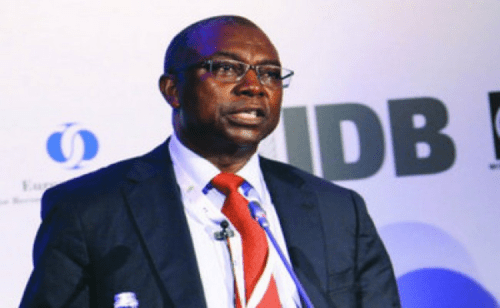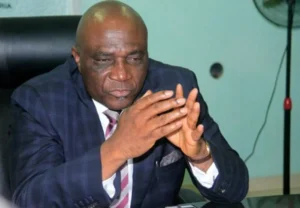
How $400m annual insurance on ships impedes Nigeria’s trade — NIMASA DG
…alleges sabotage by international cartel
…dumps initial plan for N50bn floating dock
By Seun Ibiyemi
The Director General of the Nigerian Maritime Administration and Safety Agency (NIMASA), Dr. Dayo Mobereola, has alleged that the war risk premium imposed on ships coming into Nigeria persists due to the influence of a cartel within the international insurance sector.
This is even as NIMASA reaffirmed commitment towards debt recovery from critical stakeholders in the shipping industry.
Despite significant improvements in maritime security, this premium continues to inflate the cost of freight for Nigerian-bound cargo.
Nigeria pays a minimum of $400 million annually to the insurance firms when there has not been any attack on vessels in the last two years.
Speaking during an interactive session with maritime media on Monday, Dr. Mobereola highlighted the need for Nigeria to collaborate with global maritime organisations to tackle the entrenched practices that sustain the war risk premium.
However, not unveiling the identities of the cartel, he said that, despite significant improvements in maritime security, the premium continues to add to the cost of trade for Nigeria.
He stressed that the development underlines the need for a coordinated international effort to address the issue.
“One of the points I raised during my visit to Chatham House is how the war risk insurance placed on Nigerian-bound cargoes can be reduced. It is a cartel that is behind the war risk insurance premium. They are making so much money from it and will rather leave it the way it is than remove it,” Dr Mobereola explained.
He said, “In all honesty, Nigeria alone cannot do it. We need the international maritime organisations to be with us,” he stated, pointing out that the war risk premium is not determined by the actual risk level but by a cartel profiting from the status quo.
“Despite Nigeria’s concerted efforts to curb piracy and enhance maritime security, the war risk premium has not seen a corresponding decrease.
“Even if we have zero piracy and no security incidents for the next ten years, if we don’t force the issue, they will continue to charge us,” Dr. Mobereola lamented.
He argued that these premiums, which significantly elevate freight costs for imports and exports, are being artificially sustained by insurers who are well aware of the improved security situation but prefer to maintain the high charges to maximise profits.
To counter this, he said NIMASA has initiated discussions with key international partners, including taking the matter to the United Nations.
“We’ve engaged them, and we’re taking it to the United Nations. The UN is going to support us, and we will be able to take it to the insurers who will have no choice but to reduce it as well,” Dr. Mobereola asserted.
He stressed that with the backing of the UN and other international stakeholders, Nigeria would be in a stronger position to challenge the insurers, forcing them to adjust the premiums in line with the actual risk
Speaking on the N50 billion modular floating dock, Dr. Mobereola stated, “The initial plan for the floating dock was not the right one.
“We are going to put the Modular Floating Dock to very good use so that once it’s in operation, it will benefit the economy, seafarers, and NIMASA itself.
“We need to place the modular floating dock in an appropriate location. It is just a matter of time; we will soon get that done.”
Speaking on the enigmatic Cabotage Vessels Financing Fund (CVFF), Mobereola maintained that the fund is intact and that the agency is fine-tuning a new process through which the fund would be disbursed for efficient use
“The CVFF as at today, is with the federal government and it is for the use of ship owners, it has not been touched, it is not a revenue, it is a contribution towards the development of the Nigerian shipping industry and ship owners.
“That is recognised and that is what it is going to be used for as long as we come back with the fine-tuned guidelines on how to use it which we have been working on with my Executive Directors day in day out.
“We are also exploring other avenues to ensure that this CVFF is not just CVFF but enlarged in such a way that we can even leverage on it
“All of the plans we are looking into and it shall be to the benefit of the country,” he submitted.
He noted that the companies have been hired to help recover monies owed by stakeholders.
He added that he is working on a review of the 2007 NIMASA Act to tackle piracy on the nation’s territorial waters.
Mobereola said that the bill, when reviewed, would give NIMASA the right to control and monitor all kinds of vessel operations in the nation’s territorial waters.
“The menace that has been carried out in the maritime domain is not done by the biggest vessels but the smaller vessels.
“We will ensure all boats operating on our waters are well regulated to stop piracy,” Mobereola said.
He promised to meet with the National Inland Waterways Authority (NIWA) so they could agree on how the smaller boats would be properly regulated.
The NIMASA Act 2007 also known as the Merchant Shipping Act makes provision for shipping and the registration, licensing, and marking of ships in Nigeria.
The 2007 NIMASA Act also contains provisions relative to the carriage of dangerous goods by ships and the prevention of pollution from ships
The DG also briefly touched on ongoing initiatives by NIMASA to address other critical issues in the maritime sector, including the certification of competency (COCs) and the development of Officer of the Watch (OOW) programs as part of broader solutions aimed at enhancing the agency’s operational effectiveness.




